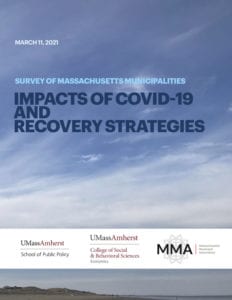Who is a member?
Our members are the local governments of Massachusetts and their elected and appointed leadership.
 Researchers from the University of Massachusetts Amherst have released the results of a statewide survey of Massachusetts municipalities about the impacts of the pandemic over the past year.
Researchers from the University of Massachusetts Amherst have released the results of a statewide survey of Massachusetts municipalities about the impacts of the pandemic over the past year.
The majority of Massachusetts municipalities reported significant to extreme impacts of COVID-19 on municipal operations (78%) and local economies (65%) since last March.
Sixty percent of respondents said they definitely have the ability to administer vaccines, and another 9% said they probably do. Only 8% of municipalities reported that they definitely do not have the ability to administer vaccines, and 13% said they probably do not.
The MMA was a partner in the survey project, and researchers received responses from one-third of the state’s municipalities (117) between Feb. 22 and March 2.
• Download the executive summary of the survey
The survey asked questions covering eight areas:
• Impacts on municipal operations
• Strategies adopted by municipalities in their emergency response and current priorities
• Funding and financial impacts on municipal budgets
• Vaccine preparedness, planning and best practices
• Equity indicators used in monitoring the impacts of the COVID-19 crisis
• Impacts on vulnerable populations, in particular food and housing security
• Impacts on local businesses
• Possible strategies for an inclusive and sustainable post-COVID socio-economic recovery
While 75% of municipalities reported having enough financial resources to start vaccination clinics, 72% indicated that they do not have access to sufficient vaccine supply. In response to an open-ended survey question asking what the most helpful resource would be to support municipal vaccine distribution efforts, 63% of respondents identified a larger and more continuous vaccine supply as the most important resource.
Several respondents reported concerns about equitable access to vaccines in rural versus urban areas of Massachusetts, and some municipalities indicated that they may be forced to close their vaccination clinics because of lack of vaccine supply.
In order to better assist their residents, 81% have a page on their municipal website providing regular, updated information on vaccinations, 61% have volunteers to assist with vaccination registration and scheduling by phone and 59% have developed outreach and education programs about COVID-19 and vaccination. More than 40% of municipalities have developed services to support vaccinations for elderly and vulnerable populations, including transportation to and from vaccination sites and the ability to provide vaccinations at home.
Cooperation has proven key to the municipal response to the pandemic, as 73% of the survey’s respondents have developed local or regional partnerships with other institutions (hospitals, higher education institutions, EMS, councils on aging, etc.), and 62% have developed local partnerships with neighboring municipalities.
In addition to preparing for vaccine distribution, the survey found that the top priority areas for municipalities in relation to COVID-19 are enhancing public health and safety protocols in order to facilitate the continuity of in-person learning, and tackling municipal budget and finance challenges.
Vaccinations will be key to addressing the local economic impact created by the pandemic, as 59% of Massachusetts municipalities reported significant to severe impacts to local businesses associated with the COVID-19 crisis, with the strongest impacts on small businesses.
More than 70% of municipalities reported that at least half of hospitality businesses and small businesses had to limit operations, and more than 35% of municipalities reported that at least 10% of businesses in these categories had to permanently close. Over 55% of municipalities reported that at least half of retail businesses and service businesses had to limit operations, and a quarter of municipalities reported that at least 10% of these businesses had to permanently close.
Post-pandemic, 32% of municipalities reported having internally discussed the possibility of a “green recovery,” aiming for low-carbon economic growth that prioritizes renewable energy, energy efficiency, green transportation and other environmentally-beneficial projects. More than 90% of the survey’s respondents indicated moderate to strong interest in investments in installing more renewable energy capacity, investing in electric vehicle charging infrastructure, and nature-based solutions to enhance water security, climate resilience, climate adaptation and disaster risk-reduction.
“This survey allowed our team to collect abundant data and we plan to pursue our analysis toward the publication of a research paper that includes spatial analyses,” said principal investigator Marta Vicarelli, assistant professor of economics and public policy. “This will allow us to assess how needs, priorities and resources are distributed across Massachusetts municipalities as they respond to the COVID-19 crisis.
“We will also focus on recovery plans, and we will examine how optimal recovery strategies may differ across municipalities with different characteristics and needs.
“We hope that our work will contribute to inform effective socio-economic recovery strategies toward a sustainable, resilient, and inclusive future,” she said.
The complete survey, “Impacts of COVID-19 and Recovery Strategies,” can be found on the School of Public Policy’s website.
The survey was distributed online by the MMA to municipal leaders in each of the state’s 351 cities and towns. Two town managers, two mayors and members of the MMA leadership team assisted the UMass team in the survey’s development.